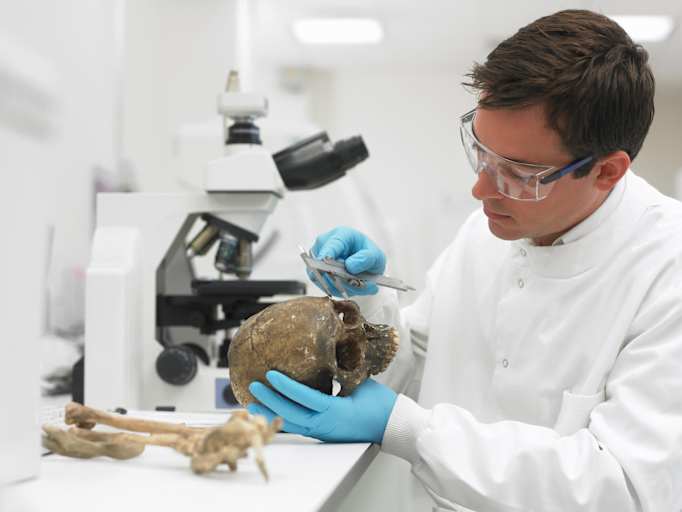Bachelor’s in Computer Forensics Degree Guide
The FBI Internet Crime Report found that there were 880,418 cybersecurity-related crimes in the U.S. in 2023 alone, with $12.5 billion lost to internet crimes that year.
If you want to build a career helping prevent and track cyber crimes, a computer forensics degree could be right for you. Computer forensics is a growing field in which you’ll gain expertise in mining computer hardware and networks to track down the source of cyberattacks.
Learn what a computer forensics program entails, what courses you’ll take, and what jobs you can get with this degree.
What Is Computer Forensics?
Computer forensics is all about investigating and identifying sources of cybersecurity attacks.
While other forms of cybersecurity focus on prevention, computer forensics specializes in locating stored evidence from a computer. For example, computer forensics professionals may work to recover lost data from failed drives, servers, or reformatted operating systems.
These professionals also work to uncover evidence that may be used in a court of law. Government agencies, corporations, and legal offices all employ computer forensics degree holders.
To succeed in this role, you must be adept at applying digital forensics skills in fields such as law enforcement and criminal law. Other crucial skills include communication, critical thinking, an advanced understanding of criminal law, and problem-solving.
Coursework in a Computer Forensics Degree Program
In a bachelor’s in computer forensics degree program, you’ll typically study topics like foundations of cybersecurity, digital forensics analysis, white-collar crime, operating systems, and programming languages.
You’ll also likely complete a senior seminar or project and an internship.
Common courses include:
- Digital Crime Evidence and Procedure: Basics of legal concepts and procedures for investigating criminal activity related to computers and computer-based systems
- Computer Ethics: Social impact of computer technology, including governmental and organizational policies for ethical uses of technology
- Digital Forensics: How to apply basic forensic techniques to investigate illegal and unethical activity on a computer or within a local area network
- Information Systems Security and Auditing: Risk factor analysis to design a flexible and comprehensive security plan
Can You Earn a Computer Forensics Degree Online?
Yes, you can earn a computer forensics degree online. While you won’t get in-person networking and a traditional classroom environment, online degrees still offer the same rigorous coursework and job preparation.
You can find online computer forensics degree programs at popular schools like Champlain College and Excelsior College.
Some online computer forensics programs are degree-completion programs that require you to have an associate degree or a certain number of college credits before enrolling.
Other online courses of study are full, four-year bachelor’s degree programs in computer forensics that require students to earn 120 credits.
Explore Top Programs Similar to Computer Forensics
Computer Forensics Jobs and Salary
With a bachelor’s degree in computer forensics, you can work at computer companies, consulting firms, or business and financial companies. You could help a government agency or corporation with criminal investigations and with preventing data breaches and cyberattacks.
Computer forensics salaries are generally well above average. Data from the Bureau of Labor Statistics (BLS) shows that information security analysts earned a median annual wage of $120,360 in May 2023 — more than double the median salary for all jobs.
Job prospects for computer forensics professionals are also strong: The BLS projects jobs for information security analysts will grow 32% between 2022 and 2032.
A master’s degree in computer forensics or cybersecurity can accelerate job growth, increase opportunities for specialization, and increase salary potential.
| Job | Annual Salary | Job Growth Rate (2022-2032) |
|---|---|---|
| Information Security Analysts | $120,360 (May 2023) | 32% |
| Forensic Computer Analysts | $78,750 (May 2024) | N/A |
| Computer Forensics Technicians | $64,940 (May 2023) | 13% |
Should You Get a Computer Forensics Degree?
Whether a computer forensics degree is right for you depends on your interest, skills, and budget. If you like the idea of tracing cyberattacks and identifying data breaches, computer forensics could lead to a fulfilling career.
As a computer forensics analyst, you’ll investigate what happens after a cyber incident. You’ll get the opportunity to use computer, investigative, and problem-solving skills to identify, recover, and analyze data from devices.
Pros of a Computer Forensics Degree
Enter a fast-growing industry
Likely earn an above-average salary
Be instrumental in helping to solve crimes
Cons of a Computer Forensics Degree
Requires strong computer and technical skills
Must apply creativity and problem-solving to diverse situations, which may prove challenging for some
Can be stressful, especially after a cyberattack has occurred
Frequently Asked Questions About Computer Forensics Degree Programs
If you want to launch a career in computer forensics, it’s best to earn at least a bachelor’s degree in computer forensics or a related field like computer science, cybersecurity, or criminal justice.
Explore More College Resources

How to Become a Criminal Investigator
Learn about requirements, salary, and career paths for becoming a criminal investigator.

by Jennifer Lee
Updated April 16, 2024

Best Online Cybercrime Programs
Earning a cyber crime degree online can lead to a lucrative and in-demand career. Explore costs, career opportunities, and typical courses.

by Marisa Upson
Updated February 13, 2024


